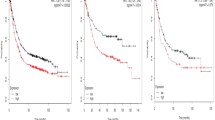Abstract
Background
Notch1 regulates cell proliferation, development, and apoptosis. Aberrant expression of Notch1 has been discovered in many types of tumors. We examined Notch1 expression in colorectal cancer to assess its role as a prognostic indicator.
Methods
Notch1 protein expression was examined by immunohistochemistry in 223 surgically resected specimens of colorectal cancer and adjacent tissues. The relationship between various clinicopathological features and overall patient survival rate was analyzed. The association of Notch1 expression with the colorectal cancer survival rate was assessed by Kaplan–Meier and Cox proportional-hazards regression.
Results
Significantly high Notch1 expression was found in colorectal cancer cells compared with that of normal colorectal epithelial cells. Notch1 was positively correlated with depth of invasion (P = 0.005), lymph node metastases (P = 0.03), and tumor–node–metastasis (TNM) stage (P < 0.001). Consistently, the overall survival rate was significantly lower for patients with Notch1-positive than those with Notch1-negative tumors. However, no correlation between Notch1 expression and patient age, sex or tumor location was found.
Conclusion
Notch1 might serve as a novel prognostic marker that is independent of, and additive to, the TNM staging system.

Similar content being viewed by others
References
Wang J. Current and future situation of colorectal carcinoma screening. J Dig Surg. 2006;5:303–5
Fang SG, Yang JZ, Yang F. Clinical characteristics of 610 cases with multiple primary malignant neoplasm’s in digestive tract. Shijie Huaren Xiaohua Zazhi. 1999;7:812
Wang MR, Guo CH, Li MS, Yu GP, Yin XS, Cui GP, et al. A case-control study on the dietary risk factors of upper digestive tract cancer. Zhonghua Liuxingbingxue Zazhi. 1999;20:95–7
Yu BM, Zhao R. Molecular biology of colorectal carcinoma. Shijie Huaren Xiaohua Zazhi. 1999;7:173–5
Chen SY, Wu TF, Liu HY, Wang JY, Zhang SS, Zhang XD. Hospital-based ten-year data of gastroendoscopy. Shijie Huaren Xiaohua Zazhi. 1999;7:15–17
Jundt F, Anagnostopoulos I, Forster R, et al. Activated Notch1 signaling promotes tumor cell proliferation and survival in Hodgkin and anaplastic large cell lymphoma. Blood. 2002;99:3398–403.
Miele L, Osborne B. Arbiter of differentiation and death: notch signaling meets apoptosis. J Cell Physiol. 1999;181:393–409.
Brown RS, Wahl RL. Overexpression of Glut-1 glucose transporter in human breast cancer: an immunohistochemical study. Cancer. 1993, 72 :2979–85.
Greenwald I. LIN-12/Notch signaling: lessons from worms and flies. Genes Dev. 1998;12:1751–62.
Artavanis-Tsakonas S, Rand MD, Lake RJ. Notch signaling: cell fate control and signal integration in development. Science. 1999;284:770–6.
Bigas A, Martin DI, Milner LA. Notch1 and Notch2 inhibit myeloid differentiation in response to different cytokines. Mol Cell Biol. 1998;18:2324–33.
Mumm JS, Kopan R. Notch signaling: from the outside in. Dev Biol. 2000;228:151–65.
Dievart A, Beaulieu N, Jolicoeur P. Involvement of Notch1 in the development of mouse mammary tumors. Oncogene. 1999;18:5973–81.
Kiaris H, Politi K, Grimm LM, et al. Modulation of notch signaling elicits signature tumors and inhibits hras1-induced oncogenesis in the mouse mammary epithelium. Am J Pathol. 2004;165:695–705.
Weng AP, Aster JC. Multiple niches for Notch in cancer: context is everything. Curr Opin Genet Dev. 2004;14:48–54.
Joutel A, Tournier-Lasserve E. Notch signalling pathway and human diseases. Semin Cell Dev Biol. 1998;9:619–25.
Nicolas M, Wolfer A, Raj K, et al. Notch1 functions as a tumor suppressor in mouse skin. Nat Genet. 2003;33:416–21.
Sriuranpong V, Borges MW, Ravi RK, et al. Notch signaling induces cell cycle arrest in small cell lung cancer cells. Cancer Res. 2001;61:3200–5.
Chu D, Wang W, Xie H, et al. Notch1 expression in colorectal carcinoma determines tumor differentiation status. J Gastrointest Surg. 2009;13:253–60.
Reedijk M, Odorcic S, Chang L, et al. High-level coexpression of JAG1 and NOTCH1 is observed in human breast cancer and is associated with poor overall survival. Cancer Res. 2005;65(18):8530–7.
Rhodes A, Jasani B, Barnes DM, et al. Reliability of immunohistochemical demonstration of oestrogen receptors in routine practice: interlaboratory variance in the sensitivity of detection and evaluation of scoring systems. J Clin Pathol. 2000, 53:125–30
Egan SE, St-Pierre B, Leow CC. Notch receptors, partners and regulators: from conserved domains to powerful functions. Curr Top Microbiol Immunol. 1998;228:273–324.
Callahan R, Egan SE. Notch signaling in mammary development and oncogenesis. J Mammary Gland Biol Neoplasia. 2004;9:145–63.
Yeh TS, Wu CW, Hsu KW, et al. The activated Notch1 signal pathway is associated with gastric cancer progression through cyclooxygenase-2. Cancer Res. 2009;69:5039–48.
Jundt F, Probsting KS, Anagnostopoulos I, et al. Jagged1-induced Notch signaling drives proliferation of multiple myeloma cells. Blood. 2004;103:3511–5.
Miele L. Notch signaling. Clin Cancer Res. 2006;12:1074 –9.
Bell SM, Scott N, Cross D, et al. Prognostic value of p53 overexpression and c-Ki-ras gene mutations in colorectal cancer. Gastroenterology. 1993;104:57–64.
Benhattar J, Losi L, Chaubert P, Givel JC, Costa J. Prognostic significance of K-ras mutations in colorectal carcinoma. Gastroenterology. 1993;104:1044–8.
Moertel CG, Fleming TR, Macdonald JS, et al. Levamisole and fluorouracil for adjuvant therapy of resected colon carcinoma. N Engl J Med. 1990;322:352–8.
Moertel CG, FlemingTR, Macdonald JS, et al. Fluorouracil plus levamisole as effective adjuvant therapy after resection of stage III colon carcinoma: a final report. Ann Intern Med. 1995;122:321–6.
Acknowledgment
This work was supported by the National Natural Science Foundation of China (No. 30571803).
Author information
Authors and Affiliations
Corresponding author
Additional information
Dake Chu and Yunming Li contributed equally to this article.
Rights and permissions
About this article
Cite this article
Chu, D., Li, Y., Wang, W. et al. High Level of Notch1 Protein is Associated with Poor Overall Survival in Colorectal Cancer. Ann Surg Oncol 17, 1337–1342 (2010). https://doi.org/10.1245/s10434-009-0893-7
Received:
Published:
Issue Date:
DOI: https://doi.org/10.1245/s10434-009-0893-7




